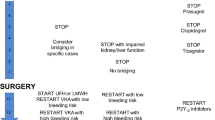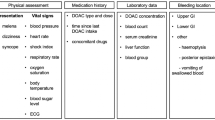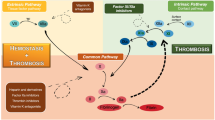Abstract
We investigated in vitro the management of intraprocedural anticoagulation in patients requiring immediate percutaneous coronary intervention (PCI) while using regular direct oral anticoagulants (DOACs). Twenty-five patients taking 20 mg of rivaroxaban once daily comprised the study group, while five healthy volunteers included the control group. In the study group, a beginning (24 h after the last rivaroxaban dose) examination was performed. Then, the effects of basal and four different anticoagulant doses (50 IU/kg unfractionated heparin (UFH), 100 IU/kg UFH, 0.5 mg/kg enoxaparin, and 1 mg/kg enoxaparin) on coagulation parameters were investigated at the 4th and 12th h following rivaroxaban intake. The effects of four different anticoagulant doses were evaluated in the control group. The anticoagulant activity was assessed mainly by anti-factor Xa (anti-Xa) levels. Beginning anti-Xa levels were significantly higher in the study group than in the control group (0.69 ± 0.77 IU/mL vs. 0.20 ± 0.14 IU/mL; p < 0.05). The study group’s 4th and 12th-h anti-Xa levels were significantly higher than the beginning level (1.96 ± 1.35 IU/mL vs. 0.69 ± 0.77 IU/mL; p < 0.001 and 0.94 ± 1.21 IU/mL vs. 0.69 ± 0.77 IU/mL; p < 0.05, respectively). Anti-Xa levels increased significantly in the study group with the addition of UFH and enoxaparin doses at the 4th and 12th h than the beginning (p < 0.001 at all doses). The safest anti-Xa level (from 0.94 ± 1.21 to 2.00 ± 1.02 IU/mL) was achieved 12 h after rivaroxaban with 0.5 mg/kg enoxaparin. Anticoagulant activity was sufficient for urgent PCI at the 4th h after rivaroxaban treatment, and additional anticoagulant administration may not be required at this time. Twelve hours after taking rivaroxaban, administering 0.5 mg/kg of enoxaparin may provide adequate and safe anticoagulant activity for immediate PCI. This experimental study result should confirm with clinical trials (NCT05541757).



Similar content being viewed by others
Data Availability
This trial data will be shared if the editor wants to evaluate.
References
Asmis LM, Alberio L, Angelillo-Scherrer A, Korte W, Mendez A, Reber G et al (2012) Rivaroxaban: quantification by anti-FXa assay and influence on coagulation tests: a study in 9 Swiss laboratories. Thromb Res 129:492–498. https://doi.org/10.1016/j.thromres.2011.06.031
Batra G, Svennblad B, Held C, Jernberg T, Johanson P, Wallentin L et al (2016) All types of atrial fibrillation in the setting of myocardial infarction are associated with impaired outcome. Heart 102:926–933. https://doi.org/10.1136/heartjnl-2015-308678
Benjamin EJ, Levy D, Vaziri SM, D’Agostino RB, Belanger AJ, Wolf PA (1994) Independent risk factors for atrial fibrillation in a population-based cohort. The Framingham Heart Study. JAMA 271:840–844
Beyer J, Trujillo T, Fisher S, Ko A, Lind SE, Kiser TH (2016) Evaluation of a heparin-calibrated antifactor Xa assay for measuring the anticoagulant effect of oral direct Xa inhibitors. Clin Appl Thromb Hemost 22:423–428. https://doi.org/10.1177/1076029616629759
Braga CG, Ramos V, Martins J, Arantes C, Abreu G, Vieira C et al (2015) Impact of atrial fibrillation type during acute coronary syndromes: clinical features and prognosis. Rev Port Cardiol 34:403–410. https://doi.org/10.1016/j.repc.2015.01.010
Collet JP, Huber K, Cohen M, Zeymer U, Goldstein P, Pollack C Jr et al (2013) ATOLL Investigators. A direct comparison of intravenous enoxaparin with unfractionated heparin in primary percutaneous coronary intervention (from the ATOLL trial). Am J Cardiol 112:1367–1372. https://doi.org/10.1016/j.amjcard.2013.07.003
Collet JP, Thiele H, Barbato E, Barthélémy O, Bauersachs J, Bhatt DL et al (2021) ESC Scientific Document Group, 2020 ESC Guidelines for the management of acute coronary syndromes in patients presenting without persistent ST-segment elevation. Eur Heart J 42:1289–1367. https://doi.org/10.1093/eurheartj/ehaa575
Douxfils J, Tamigniau A, Chatelain B, Chatelain C, Wallemacq P, Dogné JM et al (2013) Comparison of calibrated chromogenic anti-Xa assay and PT tests with LC–MS/MS for the therapeutic monitoring of patients treated with rivaroxaban. Thromb Haemost 110:723–731. https://doi.org/10.1160/TH13-04-0274
Hindricks G, Potpara T, Dagres N et al (2021) ESC Scientific Document Group. 2020 ESC Guidelines for the diagnosis and management of atrial fibrillation developed in collaboration with the European Association for Cardio-Thoracic Surgery (EACTS): the Task Force for the diagnosis and management of atrial fibrillation of the European Society of Cardiology (ESC) developed with the special contribution of the European Heart Rhythm Association (EHRA) of the ESC. Eur Heart J 42:373–498. https://doi.org/10.1093/eurheartj/ehaa612
Hirsh J, Bauer KA, Donati MB, Gould M, Samama MM, Weitz JI (2008) Parenteral anticoagulants: American College of Chest Physicians Evidence-Based Clinical Practice Guidelines (8th Edition). Chest 133(6 Suppl):141S–159S. https://doi.org/10.1378/chest.08-0689
Ibanez B, James S, Agewall S, Antunes MJ, Bucciarelli-Ducci C, Bueno H et al (2018) ESC Scientific Document Group, 2017 ESC Guidelines for the management of acute myocardial infarction in patients presenting with ST-segment elevation: the Task Force for the management of acute myocardial infarction in patients presenting with ST-segment elevation of the European Society of Cardiology (ESC). Eur Heart J 39:119–177. https://doi.org/10.1093/eurheartj/ehx393
January CT, Wann LS, Calkins H, Chen LY, Cigarroa JE, Cleveland JC Jr et al (2019) 2019 AHA/ACC/HRS focused update of the 2014 AHA/ACC/HRS guideline for the management of patients with atrial fibrillation: a report of the American College of Cardiology/American Heart Association Task Force on Clinical Practice Guidelines and the Heart Rhythm Society. J Am Coll Cardiol 74:104–132. https://doi.org/10.1016/j.jacc.2019.01.011
Kereiakes DJ, Grines C, Fry E, Esente P, Hoppensteadt D, Midei M et al (2001) NICE 1 and NICE 4 investigators. National Investigators Collaborating on Enoxaparin. Enoxaparin and abciximab adjunctive pharmacotherapy during percutaneous coronary intervention. J Invasive Cardiol 13:272–278
Kralev S, Schneider K, Lang S, Süselbeck T, Borggrefe M (2011) Incidence and severity of coronary artery disease in patients with atrial fibrillation undergoing first-time coronary angiography. PLoS One 6:e24964. https://doi.org/10.1371/journal.pone.0024964
Lip GY, Laroche C, Dan GA, Santini M, Kalarus Z, Rasmussen LH et al (2014) A prospective survey in European Society of Cardiology member countries of atrial fibrillation management: baseline results of EURObservational Research Programme Atrial Fibrillation (EORP-AF) pilot general registry. Europace 16:308–319. https://doi.org/10.1093/europace/eut373
Lip GYH, Collet JP, Haude M, Byrne R, Chung EH, Fauchier L et al (2019) ESC Scientific Document Group, 2018 Joint European consensus document on the management of antithrombotic therapy in atrial fibrillation patients presenting with acute coronary syndrome and/or undergoing percutaneous cardiovascular interventions: a joint consensus document of the European Heart Rhythm Association (EHRA), European Society of Cardiology Working Group on Thrombosis, European Association of Percutaneous Cardiovascular Interventions (EAPCI), and European Association of Acute Cardiac Care (ACCA) endorsed by the Heart Rhythm Society (HRS), Asia-Pacific Heart Rhythm Society (APHRS), Latin America Heart Rhythm Society (LAHRS), and Cardiac Arrhythmia Society of Southern Africa (CASSA). Europace 21:192–193. https://doi.org/10.1093/europace/euy174
Lopes RD, Li L, Granger CB, Wang TY, Foody JM, Funk M et al (2012) Atrial fibrillation and acute myocardial infarction: antithrombotic therapy and outcomes. Am J Med 125:897–905. https://doi.org/10.1016/j.amjmed.2012.04.006
Moliterno DJ, Hermiller JB, Kereiakes DJ, Yow E, Applegate RJ, Braden GA, et al; ELECT Investigators. A novel point-of-care enoxaparin monitor for use during percutaneous coronary intervention. The results of the Evaluating Enoxaparin Clotting Times (ELECT) Study. J Am Coll Cardiol 2003;42:1132-1139. https://doi.org/10.1016/s0735-1097(03)01053-2.
Montalescot G, Cohen M, Salette G, Desmet WJ, Macaya C, Aylward PE et al (2008) STEEPLE Investigators. Impact of anticoagulation levels on outcomes in patients undergoing elective percutaneous coronary intervention: insights from the STEEPLE trial. Eur Heart J 29:462–471. https://doi.org/10.1093/eurheartj/ehn008
Montalescot G, White HD, Gallo R, Cohen M, Steg PG, Aylward PE et al (2006) STEEPLE Investigators. Enoxaparin versus unfractionated heparin in elective percutaneous coronary intervention. N Engl J Med 355:1006–1017. https://doi.org/10.1056/NEJMoa052711
Nadler SB, Hidalgo JH, Bloch T (1962) Prediction of blood volume in normal human adults. Surg 51:224–232
Neumann FJ, Sousa-Uva M, Ahlsson A, Alfonso F, Banning AP, Benedetto U et al (2019) ESC Scientific Document Group. 2018 ESC/EACTS Guidelines on myocardial revascularization. Eur Heart J 40:87–165. https://doi.org/10.1093/eurheartj/ehy394
Rodríguez-Mañero M, López-Pardo E, Cordero-Fort A, Martínez-Sande JL, Peña-Gil C, Platas JN et al (2019) Prevalence and outcomes of atrial fibrillation in a European healthcare area gained through the processing of a health information technology system. Rev Port Cardiol 38:21–29. https://doi.org/10.1016/j.repc.2018.06.008
Ruff CT, Giugliano RP, Braunwald E, Hoffman EB, Deenadayalu N, Ezekowitz MD et al (2014) Comparison of the efficacy and safety of new oral anticoagulants with warfarin in patients with atrial fibrillation: a meta-analysis of randomised trials. Lancet 383:955–962. https://doi.org/10.1016/S0140-6736(13)62343-0
Samama MM, Contant G, Spiro TE, Perzborn E, Le Flem L, Guinet C et al (2013) Laboratory assessment of rivaroxaban: a review. Thromb J 11:11. https://doi.org/10.1186/1477-9560-11-11
Sutton NR, Seth M, Ruwende C, Gurm HS (2016) Outcomes of patients with atrial fibrillation undergoing percutaneous coronary intervention. J Am Coll Cardiol 68:895–904. https://doi.org/10.1016/j.jacc.2016.05.085
Topaz G, Flint N, Steinvil A, Finkelstein A, Banai S, Keren G et al (2017) Long term prognosis of atrial fibrillation in ST-elevation myocardial infarction patients undergoing percutaneous coronary intervention. Int J Cardiol 240:228–233. https://doi.org/10.1016/j.ijcard.2017.03.060
Vranckx P, Leebeek FW, Tijssen JG, Koolen J, Stammen F, Herman JP et al (2015) Peri-procedural use of rivaroxaban in elective percutaneous coronary intervention to treat stable coronary artery disease. The X-PLORER trial Thromb Haemost 114:258–267. https://doi.org/10.1160/TH15-01-0061
Willekens G, Studt JD, Mendez A, Alberio L, Fontana P, Wuillemin WA et al (2021) A universal anti-Xa assay for rivaroxaban, apixaban, and edoxaban measurements: method validation, diagnostic accuracy and external validation. Br J Haematol 193:1203–1212. https://doi.org/10.1111/bjh.17470
Author information
Authors and Affiliations
Contributions
Concept, H.A., M.M., S.A.; design, M.M., H.A., T.B.; supervision, F.V.A., T.B., K.H.; materials, M.C.C., S.A., M.Y.; data collection and/or processing, M.C.C., M.Y., H.A.; analysis and/or interpretation, H.A., M.M., T.B.; literature search, S.A., H.A., F.V.A.; writing, M.M., H.A., S.A.; critical review, H.A., M.M., T.B., K.H. All authors have read and agreed to the published version of the manuscript. The authors declare that all data were generated in-house and that no paper mill was used.
Corresponding author
Ethics declarations
Ethical approval
This trial was approved by the Bursa Yuksek Ihtisas Training and Research Hospital, Clinical Research Ethics Committee; 2011-KAEK-25 2021/03-22.
Competing interests
The authors declare no competing interests.
Additional information
Publisher’s note
Springer Nature remains neutral with regard to jurisdictional claims in published maps and institutional affiliations.
Rights and permissions
Springer Nature or its licensor (e.g. a society or other partner) holds exclusive rights to this article under a publishing agreement with the author(s) or other rightsholder(s); author self-archiving of the accepted manuscript version of this article is solely governed by the terms of such publishing agreement and applicable law.
About this article
Cite this article
Melek, M., Ari, H., Ari, S. et al. In vitro evaluation of anticoagulant therapy management when urgent percutaneous coronary intervention is required in rivaroxaban-treated patients. Naunyn-Schmiedeberg's Arch Pharmacol 396, 3221–3232 (2023). https://doi.org/10.1007/s00210-023-02533-2
Received:
Accepted:
Published:
Issue Date:
DOI: https://doi.org/10.1007/s00210-023-02533-2




